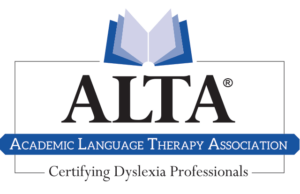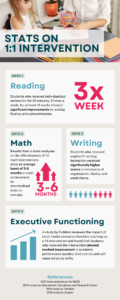No products in the cart.

Educational therapy and tutoring may appear very similar, however, there are important distinctions between the two. Knowing the differences will help you determine the best fit for the needs of your child.
The biggest and arguably most important difference is that tutoring often primarily covers what a student learns, while educational therapy also includes how a student learns.
For example, for a 3rd-grade student working on learning multiplication facts, a math tutor may provide practice sheets, fun songs or videos, and helpful tips and tricks to try and help a student commit multiplication facts to memory. An educational therapist or specialist can provide all of the above, but will also be attuned to the unique needs of each learner, especially those with identified or unidentified learning differences. An educational therapist or specialist may provide evidence-based methods, such as symbol imagery strategies, to strengthen and support working memory in order to better hold the math facts. They will also dive deeper into ensuring the student has a meaningful understanding of the concept of multiplication, how it relates to other mathematical processes and thinking, and how to apply it to real-life situations.
Another example is a young student who is struggling to learn how to read. A tutor may provide support in the forms of guided reading practice, flashcards to learn tricky sight words, and fun literacy-based activities and worksheets. An educational therapist or specialist may include some or all of the above, but will also focus on evidence-based reading instruction such as Orton-Gillingham based methodologies and programs. They will also know how to best support both the young reader’s phonological and orthographic skills in order to make steady progress in reading development.
Educational therapists and specialists often have a much higher degree of training than the average tutor, with advanced degrees in areas such as special education and educational therapy, with additional training or certifications in evidence-based practices and programs. While some tutors may also have the above qualifications, others may have a lesser degree of specialized training or education, such as an undergraduate degree in a particular content area (e.g. B.A. in English).
Furthermore, educational therapists and specialists have the knowledge and skills necessary to ensure sufficient assessment and progress monitoring in order to track a student’s growth consistently and accurately. Educational therapists and specialists use this data and information to adjust instructional approach as necessary.
While tutoring may be an ideal fit for a student who needs just a little extra academic boost or additional practice in a content area, for students with complex learning profiles, a non-specialized form of tutoring could potentially do more harm than good for a struggling learner. Feelings of self-confidence are so often entangled in a student’s academic performance and self-image. Spending time with a well-meaning tutor who lacks the specialized knowledge to address root learning difficulties may increase negative academic self-image for students, rather than improving the situation.
Educational therapists and specialists take a holistic approach to working with a student not only in particular academic areas, but also supporting social-emotional needs and supporting metacognition skills in order to help students become more confident and empowered learners.
Written by Amy Soukup, M.A. Special Education
Related Articles
Looking for Academic Support and other Educational Services?
You can schedule a free initial consultation to learn more about our services. We will listen to your concerns, answer any questions, learn about the student’s needs, and help guide you through our new student intake process.







1 Comment
I liked how you wrote that a tutor may deliver support through fun literacy-based activities and worksheets. My friend told me that her anxiety interferes with school. I think it’s time for her to turn to an educational therapy service to have proper guidance.